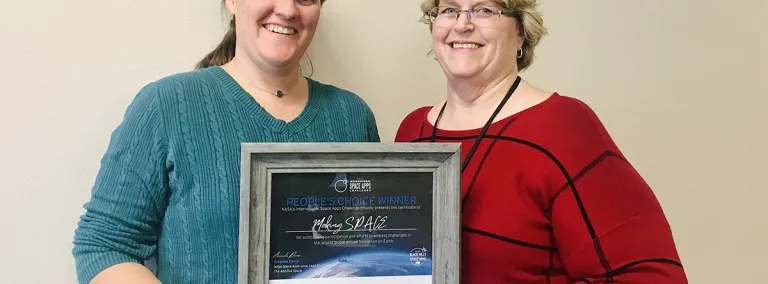SDSTA employees win NASA Space App Competition’s People’s Choice Award
Caroline Jones and Natasha Wheeler’s board game idea won local and global awards during the competition
You don’t have to be a scientist to dig into the National Aeronautics and Space Administration’s (NASA) treasure trove of data. That’s what two South Dakota Science and Technology Authority (SDSTA) employees discovered when their team received global recognition for their original idea to make use of NASA’s data.
Caroline Jones, contracts specialist at the SDSTA, formed team “Making SPACE,” with Natasha Wheeler, administrative assistant at the SDSTA, and Jones’ sister, Eveline Shoun. Together, they entered the NASA-led International Space Apps Challenge (Space Apps).
The annual challenge is “an international hackathon for coders, scientists, designers, storytellers, makers, builders, technologists, and others in cities around the world, where teams engage NASA’s free and open data to address real-world problems on Earth and in space.” The catch? Teams only have 48 hours to perfect and pitch their idea.
“I’m not a scientist or a coder, but I saw the description, and I thought it would be fun to participate!” Jones said. “I have a background as a graphics artist—I’m a very visual person—and it was the images from NASA’s James Webb Telescope that drew me in!”
On October 1 and 2, 2022, team Making SPACE developed a concept for a board game that would teach K-6 students about space, leveraging photos and data collected from the Webb telescope.
After 48 hours, the team pitched their concept to a panel of judges in Rapid City, South Dakota.
According to the group’s presentation, when playing the board game, “Players might meet a scientist whose work is important to a discovery and move forward on the board. Or a result from an experiment might create a black hole and off they go! There are worm holes, nebulae, planets, moons, asteroids... there’s no telling what kind of space material could send a player back to the beginning or to the end!”
Their pitch won first place in the local competition, moving them onto the global competition. There, out of more than 3,000 pitches submitted worldwide, the Making SPACE team won the Space Apps Challenge People’s Choice Award.
“The whole thing was just super unexpected,” Wheeler said. “Caroline asking me to join, getting to work on a NASA-sponsored project, and winning on such a short turnaround—it was one surprise after another! I was excited to get to be involved.”
Jones said she hopes to develop the concept further and create a board game that students can use to explore space. “The game could be adapted to different topics,” Jones said. “There could be a deck of cards for learning about women in space, learning about technology, learning about the universe, and the latest and greatest images from the Webb telescope.”
This was the first time the Space Apps Challenge was hosted in Rapid City. It was brought to the area by Amanda and Travis Davis, former NASA employees and Rapid City-locals.
“Very few people or organizations utilize this treasure trove of information and intellectual property simply because they do not know where to find it and/or how to use it,” Travis Davis told the Rapid City Journal. “The NASA Space Apps Challenge shines a bright light on the utilization of the data available through ideation of ‘apps,’ but we like to concurrently make people aware of the vast intellectual property available to all through technology transfer offices at NASA.”
